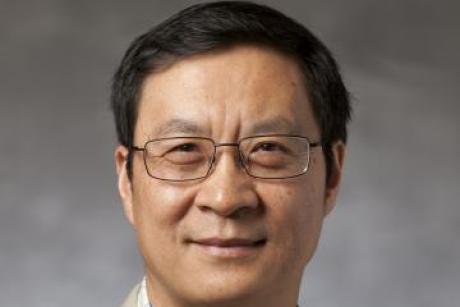
Aparnaa Velayudhan stands with two of her art pieces, black leopard and the Duke Chapel, featured in the Student Art Exhibition inside the Bryan Center's Brown Art Gallery on Duke's campus.
Published March 27, 2024, last updated on April 2, 2024 under Around DGHI
When Aparnaa Velayudhan, M.D., was three years old, a tribal conflict erupted near her home on the Solomon Islands, where her father worked with the World Health Organization. Velayudhan and her mother rushed to a ship for safety as her father and other men waited tensely for rescue.
“We were given 24 hours to pack and leave,” says Velayudhan, a first-year student in the Master of Science in Global Health program at the Duke Global Health Institute. “We didn’t know what was going to happen with our lives.”
When her family was reunited in Australia, something else happened that would change Velayudhan’s life. Her mother gave her a pencil and paper, encouraging her to draw as a way to take her mind off the family’s dislocation. Velayudhan, who earned a medical degree in the United Kingdom, has been drawing and painting ever since.
“I would always hear, ‘Keep drawing. You’re doing so well,’” Velayudhan recalls. “Regardless of difficulties I’ve faced, I always had pencils, paper and paint. I turn to it for all the emotions – happy, sad and even stressed.”
A self-taught artist, Velayudhan has created dozens of acrylic paintings and digital art through the years. Her pieces celebrate family members, benefit charities and serve as reminders of pivotal moments in her life. A few of her most cherished pieces are on display through April 8 in the Bryan Center’s Brown Art Gallery on Duke’s campus. Her work is part of the Student Art Exhibition hosted by the university’s Union’s VisArts.

A close-up the painting of Duke Chapel...
One of her pieces in the exhibit, a painting of the iconic Duke Chapel, was inspired by the moment she learned she would be coming to Duke. She was home in England, preparing for a night shift as a doctor at Leeds General Infirmary, when she saw a message from Duke. She checked it while on FaceTime with her mother, fearing it was a rejection. When she saw she was accepted, she began to cry, making her mother think it was bad news.
Soon after, Velayudhan spent 12 hours painting the chapel. “After I painted it, I knew this was actually happening,” she says. “Painting brings a sense of peace and helps me process what is happening. It became real in that moment.”
Velayudhan says the transition to living and studying in the U.S. has been seamless, and she credits how Duke faculty, staff and students welcomed her. Earlier this month, six students from her master’s cohort attended the gallery exhibit’s opening reception to celebrate her paintings.
“They are my sisters,” she says. “I feel lucky in this class to be around amazing, talented people. I feel supported and cared for by everyone. It has been huge for me.”

A close-up of a drawing by Aparnaa...
Velayudhan wants to extend that same care through her global health career. Because of the nature of her father’s work, she lived in six countries growing up, including Fiji and the Philippines, and often did school service projects in rural communities. She saw families with no clean water and insufficient food, and children forced to work to help provide for their families.
“I wouldn’t be a doctor if it wasn’t for the people in the islands and Asian countries I grew up with,” she says. “I want to make sure everyone has access to healthcare and money shouldn’t get in between that. Healthcare is a basic human right.”
Her global health thesis research will focus on the link between food insecurity and childhood obesity in Singapore, where she will travel to conduct field research this summer. She hopes her findings can inform interventions for health workers and policymakers to curtail obesity’s negative effects.
Although research will be her focus this summer, she’ll find a way to couple it with her artistry.
“I want my work to have meaning and communicate a message such as raise awareness for campaigns that don’t get the notice they deserve,” she says. “I want to contribute to health equity in any way that I can.”
To see more of Velayudhan’s artwork, follow @brushonamission on Instagram.

